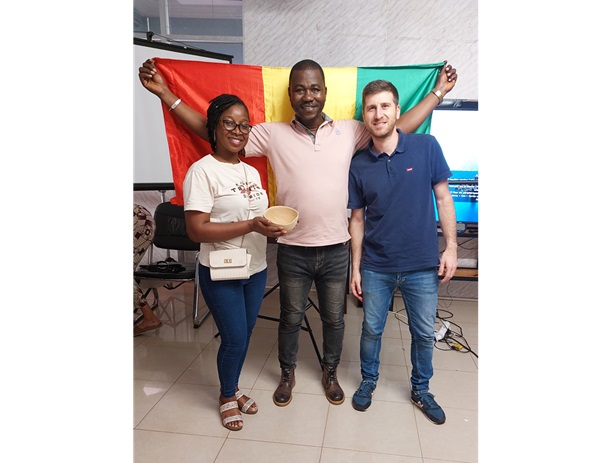 Credit: © MSF
Credit: © MSF
Ahead of World AIDS Day on 1 December, Médecins Sans Frontières (MSF; English: Doctors Without Borders) has reflected on progress made within its HIV project in Conakry, Guinea which is celebrating its 20th anniversary this year.
To mark the occasion, Nicolas De Meis, member of MSF Luxembourg's Communications and Fundraising department, travelled to Conakry from 18 September to 2 October 2023, accompanied by artistic photographer Namsa Leuba, to record the testimonies and portraits of those involved in the project over the past 20 years.
MSF noted that, in 2003, Guinea did not seem an obvious choice of location to open an HIV/AIDS project. In contrast to countries in the epicentre of the pandemic, such as some in Southern Africa, where up to one in four adults were living with HIV, just 1.7% of Guineans were HIV-positive. The limited occurrence of HIV/AIDS meant that its treatment and care were not given priority among people's various health needs, leading to restricted access to treatment.
“It was the early 2000s, I was sick all the time, I saw lots of doctors but no one could tell me what was afflicting me,” recalls Maïmouna Diallo, known as Mouna, who now works with MSF as a community focal point. “My older brother, who lived in Europe, helped me financially and took me to England to get tested. Although I couldn’t understand what they were saying, I understood it was serious.”
Despite being stigmatised by some members of her family, Mouna had support from her family, especially her brother, who paid for her to get antiretroviral (ARV) medications from abroad. “He said he would help me no matter what, even if he had to sell his house,” she said.
Owing to the expense and challenges of obtaining antiretroviral drugs (ARVs), certain patients went on and off treatment. Consequently, resistance to initial-line medications emerged, complicating the search for an effective treatment plan. In 2004, MSF achieved a milestone by becoming the inaugural organisation to offer free ARVs to HIV patients in Guinea, three years ahead of the nationwide provision of free treatment. Presently, MSF extends care to 16,425 HIV patients, constituting 20% of the 86,000 individuals undergoing treatment throughout the country.
With ARV treatment, HIV becomes a manageable, chronic condition, allowing individuals affected to live a long and healthy life. However, this is only possible if patients take the ARV treatment every day without fail. This can be more difficult than it sounds, especially when it requires a monthly visit to the doctor in a country with few health professionals. To address the issue, MSF teams in Guinea developed the ‘six-month appointment programme’ (known as ‘R6M’) whereby clinically stable patients receive sufficient supplies of ARVs to last for six months, instead of just one, thereby cutting the time, costs and travel needed to access treatment, empowering patients with increased independence in handling their condition.
According to MSF, this initiative proved effective: in 2022, 92% of patients enrolled in MSF’s R6M programme were still enrolled in care after twelve months, compared to 61% of people in the regular programme. In the same spirit, MSF brought into Guinea other successful, simplified models of care, developed abroad, that decentralised treatment and brought it closer to the community.
This included the ARV treatment distribution points (PODIs), first piloted by MSF in Democratic Republic of Congo in 2010 and introduced in Guinea in 2020.
"Through the discussions and heart-wrenching stories I had with those involved in the project, I realised just how important the work of an organisation like MSF is," explained Nicolas de Meis.
"For example, we run the only treatment unit in the country for patients at an advanced stage of the disease. I was able to see the progress that has been made in two decades in terms of treatment and care for HIV patients, but also in terms of raising awareness, which is still a major issue in Guinea. Despite the positive developments, there are still questions to be answered, in particular whether the state will one day be able to offer the same quality of care that MSF currently provides.
Apart from that, it was really interesting for me to see the work of the teams 'on the other side', in the field. My day-to-day job is more to relay the information that comes in, but this time I was the one to take the initiative", concluded Nicolas de Meis.
Nevertheless, 20 years on, despite the innovations and the progress in HIV care in Guinea, challenges remain in terms of prevention, testing, treatment and funding.
Today, not all health facilities in Guinea offer free, complete care for HIV patients. Due to financial barriers and stigma many patients still arrive at the MSF-supported HIV unit at Donka Hospital in the advanced stages of the disease. ARVs frequently experience shortages, and occasional disruptions occur in the supply chain. Moreover, a notable number of healthcare professionals lack adequate training in the management of HIV and associated conditions.
Children, particularly, encounter challenges in accessing testing and treatment for HIV. Presently, there are 11,000 children aged zero to fourteen living with HIV, with only 3,612 of them receiving treatment.








